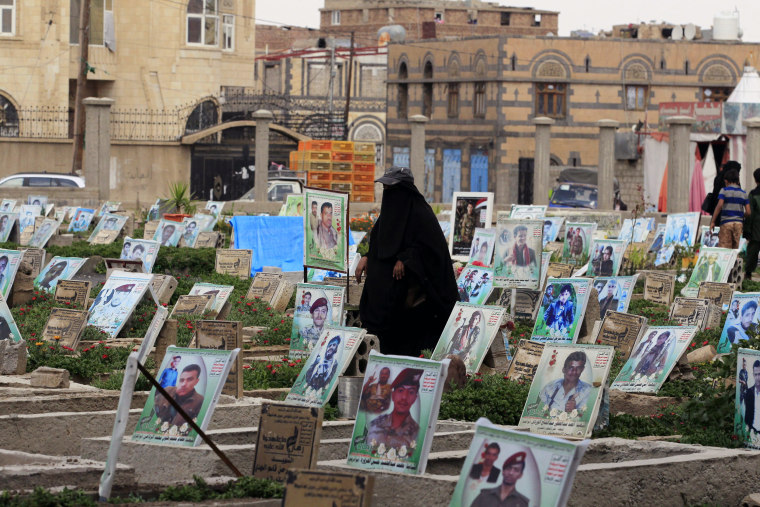Senior U.S. officials have gone further than ever before in calling for an end to the Saudi-led war in Yemen — a conflict that has pushed 14 million people to the brink of starvation.
“Coalition airstrikes must cease in all populated areas in Yemen,” Secretary of State Mike Pompeo said last Tuesday. The same day, Defense Secretary Jim Mattis said all sides needed to take meaningful steps toward a cease-fire and begin negotiations in the next 30 days.
The comments raised the prospect that the Trump administration is getting tougher with the Saudis over their military campaign against Iran-linked Houthi rebels, which has killed more than 10,000 people in the desperately poor country since 2015. All sides have been accused of violating international law and committing war crimes.

Washington supports Saudi Arabia and its ally, the United Arab Emirates, through billions in arms sales. It also refuels their jets mid-air, provides training and shares intelligence. So if the U.S. wants to try to force the Saudis' hands, it has leverage.
The best way to force the Saudis to change their ways is to stop sending weapons, according to Human Rights Watch’s Yemen researcher Kristine Beckerle.
“You’ve gotten so many violations already over the past three and a half years, so what Pompeo and Mattis should be doing is saying, ‘These are the benchmarks. We’re going to hold up weapons sales until you actually fulfill these tasks,’" she said, referring to the apparent bombing of civilian sites by the coalition.
American arms deliveries to the Saudis reached $5.5 billion last year, up from $1.7 billion in 2009, according to the U.K.-based Campaign Against Arms Trade which compiled the figures using Department of Defense statistics. The U.S. government agreed to sell more than $79 billion in arms to Riyadh over that period.
In a May 2017 stop in Saudi Arabia — his first trip abroad as president — Donald Trump announced $110 billion in immediate sales of U.S. arms and equipment, with $350 billion in additional deals over the next 10 years.
While it is unclear how much of Trump's announcement covered deals that had already been unveiled, the president has touted such arms sales to the Saudis in an effort to explain the importance of the relationship with the kingdom. American officials have also been keen to focus on what they say is the country's key role on combating terrorism and fighting Iranian influence throughout the region.
Andrew Smith of the Campaign Against Arms Trade said last week's calls for a cease-fire by Mattis and Pompeo were long overdue.
"Over the last three and a half years Saudi-led forces have inflicted a terrible humanitarian catastrophe on Yemen," he said. "We hope that the current pressure can serve as a turning point. For far too long, arms-dealing governments have prioritized arms company profits over the rights and lives of Yemeni people."
Over the summer, lawmakers included a provision in a defense bill requiring the administration to certify Saudi Arabia and its allies were trying to reduce civilian casualties in Yemen.
In August, the coalition bombed a school bus carrying children, killing dozens.
The deadly strike prompted international outrage. Weeks later, Pompeo certified to Congress that Saudi Arabia and the United Arab Emirates were working to reduce civilian casualties in Yemen — a legal requirement to allow U.S. aircraft to refuel the countries’ warplanes.
Saudi officials have not commented on last week's comments by Mattis and Pompeo.
But there are signs that the U.S. is bringing pressure to bear on Riyadh.
On Wednesday, a group of Republican senators pressed the administration to cut off civilian nuclear talks with Saudi Arabia.
A day later, the State Department confirmed senior U.S. officials have been in talks with both sides of the Yemen conflict and said that "the climate is right" for negotiations to end the war.
The Houthis are in control of much of the country, including the capital, Sanaa, and the major port city of Hodeida, which is where most food and international aid enters the country.
Fighting around Hodeida escalated over the weekend, according to The Associated Press, as airstrikes and artillery pounded rebel positions.

Considering the humanitarian crisis, some experts believe the deadline proposed by Mattis last week is too long to wait.
"More needs to be done to reach a cease-fire immediately, before the 30-day deadline, for talks to start," warned Jane Kinninmont, who specializes in peace and conflict in the Middle East and works with The Elders, a group of world leaders.
The White House had already faced growing unease over the conflict when the murder of dissident and Washington Post contributor Jamal Khashoggi prompted widespread uproar. His death intensified the focus on the Saudi government's behavior.

More pressure could be on the way.
“Congress has already placed pressure on Congress and the White House to act, and has signaled that it will continue this pressure,” said Kristian Ulrichsen, a fellow for the Middle East at Rice University's Baker Institute. “Pompeo's comments on Yemen are indicative of the fact that the secretary realizes that it may be more difficult to get re-certification of the Saudi-Emirati war effort next time around.”

